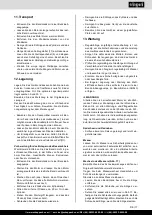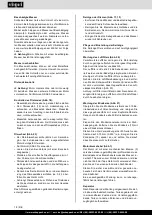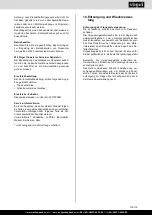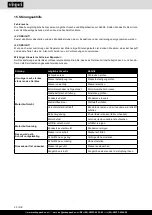
www.scheppach.com /
+(49)-08223-4002-99 /
+(49)-08223-4002-58
30 | GB
•
Clean the cooling fins of the cylinder and the hous
-
ing.
• Remove the start tension cable (17) from the hook.
Loosen the quick-release lever (5) and fold the up-
per push bar down. Make sure the cables are not
bent during this process.
• Wedge a few layers of corrugated cardboard be-
tween the upper and lower push bars and the en-
gine in order to prevent any chafing.
12. Storage
• Never store the mower (with petrol in the tank) in-
side a building in which petrol fumes could come
into contact with open flames or sparks.
• Allow the motor to cool before you put the lawn
mower in an enclosed area.
•
In order to avoid fire hazards, keep the engine, ex
-
haust and the area around the fuel tank free from
grass, leaves and leaking grease (oil).
Preparing the mower for long-term storage
Caution: Do not empty the petrol tank in enclosed
areas, near fire or when smoking. Petrol fumes can
cause explosions and fire.
• Empty the petrol tank with a petrol suction pump.
• Start the engine and let it run until any remaining
petrol has been used up.
• Change the oil at the end of every season. To do
so, remove the used engine oil from a warm engine
and refill with fresh oil.
• Remove the spark plug from the cylinder head.
• Fill the cylinder with approx. 20 ml of oil from an
oil can.
• Slowly pull back the starter handle, which will bathe
the cylinder wall with oil. Screw the spark plug back
in.
•
Clean the cooling fins of the cylinder and the hous
-
ing.
• Be sure to clean the entire machine to protect the
paint.
• Store the machine in a well-ventilated place.
13. Maintenance
• Regular, careful maintenance is required to guar-
antee the safety level and performance of the ma-
chine.
• Make sure that all nuts, bolts and screws are tight-
ened securely and that the machine is in safe work-
ing condition.
• Routinely check the grass basket for signs of wear
and impaired functionality.
Regularly clean the grass box with water and let it
dry thoroughly.
• For your own safety, replace worn or damaged
parts without delay.
• If the fuel tank should require emptying this should
only be done in the open air using a petrol suction
pump (available from DIY shops).
•
After mowing
• Allow the engine to cool before you put the lawn
mower in an enclosed area.
Remove grass, foliage, grease and oil before
storing the mower. Do not place any objects on top
of the mower.
• Check all the screws and nuts once more before
you start to use the lawn mower again. Tighten any
loose screws.
• Also be sure to empty the grass basket (16).
• Pull the spark plug boot to prevent unauthorized
use.
• Ensure that you do not park the mower next to
any source of danger. Petrol fumes can lead to
explosions.
• Only original parts or parts approved by the
manufacturer may be used for repairs (see address
on the warranty certificate).
• If the lawn mower is not going to be used for an
extended period, empty the petrol tank using a
petrol suction pump.
• Oil and maintain the machine.
10. Cleaning
The lawn mower should be thoroughly cleaned after
every use, especially the underneath and the blade
mount. To remove the gras, tip the lawn mower onto
its left side (the opposite side to the oil filling socket)
or clean the mower with water as descript below:
• Remove the mulch unit / gras box.
• Fit the hose connection to the mower and turn the
tap on. (Fig. 23)
• Start the mower and switch off again after about 30
seconds. The rotating blade bar throws the water
onto the bottom of the mower and thus cleans it.
• Turn off the tap and remove the hose connection .
• Clean the top with a cloth (do not use any sharp
objects).
•
m
Note!
Before you tip the lawn mower onto its side,
completely empty the fuel tank using a petrol suc-
tion pump. The lawn mower must never be tilted by
more than 90 degrees. Dirt and grass is easiest to
remove immediately after you have finished mowing
the grass. Dried on grass and dirt can result in poor-
er mowing performance. Check that the grass chute
is free of any residual grass. Remove any such resi-
due. Never clean the lawn mower with a water jet or
high-pressure cleaner. The engine must remain dry.
Do not use aggressive cleaning agents such as cold
cleaner or petroleum ether.
11. Transport
Preparing the mower for transportation (Fig. 22)
• Empty the petrol tank.
• Always let the engine run until it has used up the
remainder of petrol in the tank.
• Empty the engine oil from the warm engine.
• Remove the spark plug boot from the spark plug.
















































